Non-medical interventions to enhance return to work for people with cancer
- PMID: 38441440
- PMCID: PMC10913845
- DOI: 10.1002/14651858.CD007569.pub4
Non-medical interventions to enhance return to work for people with cancer
Abstract
Background: People with cancer are 1.4 times more likely to be unemployed than people without a cancer diagnosis. Therefore, it is important to investigate whether programmes to enhance the return-to-work (RTW) process for people who have been diagnosed with cancer are effective. This is an update of a Cochrane review first published in 2011 and updated in 2015.
Objectives: To evaluate the effectiveness of non-medical interventions aimed at enhancing return to work (RTW) in people with cancer compared to alternative programmes including usual care or no intervention.
Search methods: We searched CENTRAL (the Cochrane Library), MEDLINE, Embase, CINAHL, PsycINFO and three trial registers up to 18 August 2021. We also examined the reference lists of included studies and selected reviews, and contacted authors of relevant studies.
Selection criteria: We included randomised controlled trials (RCTs) and cluster-RCTs on the effectiveness of psycho-educational, vocational, physical or multidisciplinary interventions enhancing RTW in people with cancer. The primary outcome was RTW measured as either RTW rate or sick leave duration measured at 12 months' follow-up. The secondary outcome was quality of life (QoL).
Data collection and analysis: Two review authors independently assessed RCTs for inclusion, extracted data and rated certainty of the evidence using GRADE. We pooled study results judged to be clinically homogeneous in different comparisons reporting risk ratios (RRs) with 95% confidence intervals (CIs) for RTW and mean differences (MD) or standardised mean differences (SMD) with 95% CIs for QoL.
Main results: We included 15 RCTs involving 1477 people with cancer with 19 evaluations because of multiple treatment groups. In this update, we added eight new RCTs and excluded seven RCTs from the previous versions of this review that were aimed at medical interventions. All included RCTs were conducted in high-income countries, and most were aimed at people with breast cancer (nine RCTs) or prostate cancer (two RCTs). Risk of bias We judged nine RCTs at low risk of bias and six at high risk of bias. The most common type of bias was a lack of blinding (9/15 RCTs). Psycho-educational interventions We found four RCTs comparing psycho-educational interventions including patient education and patient counselling versus care as usual. Psycho-educational interventions probably result in little to no difference in RTW compared to care as usual (RR 1.09, 95% CI 0.96 to 1.24; 4 RCTs, 512 participants; moderate-certainty evidence). This means that in the intervention and control groups, approximately 625 per 1000 participants may have returned to work. The psycho-educational interventions may result in little to no difference in QoL compared to care as usual (MD 1.47, 95% CI -2.38 to 5.32; 1 RCT, 124 participants; low-certainty evidence). Vocational interventions We found one RCT comparing vocational intervention versus care as usual. The evidence was very uncertain about the effect of a vocational intervention on RTW compared to care as usual (RR 0.94, 95% CI 0.78 to 1.13; 1 RCT, 34 participants; very low-certainty evidence). The study did not report QoL. Physical interventions Four RCTs compared a physical intervention programme versus care as usual. These physical intervention programmes included walking, yoga or physical exercise. Physical interventions likely increase RTW compared to care as usual (RR 1.23, 95% CI 1.08 to 1.39; 4 RCTs, 434 participants; moderate-certainty evidence). This means that in the intervention group probably 677 to 871 per 1000 participants RTW compared to 627 per 1000 in the control group (thus, 50 to 244 participants more RTW). Physical interventions may result in little to no difference in QoL compared to care as usual (SMD -0.01, 95% CI -0.33 to 0.32; 1 RCT, 173 participants; low-certainty evidence). The SMD translates back to a 1.8-point difference (95% CI -7.54 to 3.97) on the European Organisation for Research and Treatment of Cancer Quality of life Questionnaire Core 30 (EORTC QLQ-C30). Multidisciplinary interventions Six RCTs compared multidisciplinary interventions (vocational counselling, patient education, patient counselling, physical exercises) to care as usual. Multidisciplinary interventions likely increase RTW compared to care as usual (RR 1.23, 95% CI 1.09 to 1.33; 6 RCTs, 497 participants; moderate-certainty evidence). This means that in the intervention group probably 694 to 844 per 1000 participants RTW compared to 625 per 1000 in the control group (thus, 69 to 217 participants more RTW). Multidisciplinary interventions may result in little to no difference in QoL compared to care as usual (SMD 0.07, 95% CI -0.14 to 0.28; 3 RCTs, 378 participants; low-certainty evidence). The SMD translates back to a 1.4-point difference (95% CI -2.58 to 5.36) on the EORTC QLQ-C30.
Authors' conclusions: Physical interventions (four RCTs) and multidisciplinary interventions (six RCTs) likely increase RTW of people with cancer. Psycho-educational interventions (four RCTs) probably result in little to no difference in RTW, while the evidence from vocational interventions (one RCT) is very uncertain. Psycho-educational, physical or multidisciplinary interventions may result in little to no difference in QoL. Future research on enhancing RTW in people with cancer involving multidisciplinary interventions encompassing a physical, psycho-educational and vocational component is needed, and be preferably tailored to the needs of the patient.
Copyright © 2024 The Cochrane Collaboration. Published by John Wiley & Sons, Ltd.
Conflict of interest statement
AdB: no relevant interests; involved in conducting Tamminga 2013 (GAK (social insurance) Foundation), Greidanus 2021 (Dutch Cancer Society), Zaman 2021 (Dutch Cancer Society); Tamminga 2013: co‐author, academic medical hospital Amsterdam; Greidanus 2021: co‐author, academic medical hospital Amsterdam; Zaman 2021: co‐author, academic medical hospital Amsterdam.
ST: no relevant interests; involved in conducting Tamminga 2013 (GAK (social insurance) Foundation), Greidanus 2021 (Dutch Cancer Society); Tamminga 2013: co‐author; academic medical hospital Amsterdam; Greidanus 2021: co‐author, academic medical hospital Amsterdam.
JB: Knowledge Institute of the Dutch Association of Medical Specialists (Senior Advisor); former Managing Editor of Cochrane Work, Amsterdam UMC, Amsterdam, Netherlands.
JH: no relevant interests; currently Coordinating Editor of Cochrane Work, Amsterdam UMC, Amsterdam, Netherlands.
JB and JH excluded themselves entirely from the editorial process to ensure independence. Review authors were not involved in the study selection, data extraction, risk of bias or GRADE assessment for studies where they were also involved as study co‐authors.
Figures
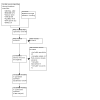
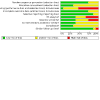
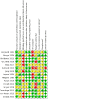
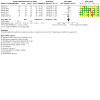
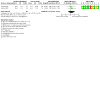
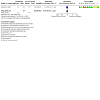
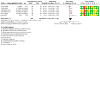
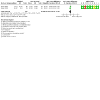
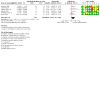
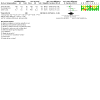
Update of
-
Interventions to enhance return-to-work for cancer patients.Cochrane Database Syst Rev. 2015 Sep 25;2015(9):CD007569. doi: 10.1002/14651858.CD007569.pub3. Cochrane Database Syst Rev. 2015. Update in: Cochrane Database Syst Rev. 2024 Mar 5;3:CD007569. doi: 10.1002/14651858.CD007569.pub4. PMID: 26405010 Free PMC article. Updated.
References
References to studies included in this review
Berglund 1994 {published data only}
-
- Berglund G, Bolund C, Gustafsson UL, Sjödén P-O. One-year follow-up of the 'Starting Again' group rehabilitation programme for cancer patients. European Journal of Cancer 1994;30A(12):1744-51. - PubMed
Burgio 2006 {published data only}
-
- Burgio KL, Goode PS, Urban DA, Umlauf MG, Locher JL, Bueschen A, et al. Preoperative biofeedback assisted behavioral training to decrease post-prostatectomy incontinence: a randomized, controlled study. Journal of Urology 2006;175(1):196-201. - PubMed
Greidanus 2021 {published data only}
-
- Greidanus MA, Rijk AE, Boer AG, Bos ME, Plaisier PW, Smeenk RM, et al. A randomised feasibility trial of an employer-based intervention for enhancing successful return to work of cancer survivors (MiLES intervention). BMC Public Health 2021;21(1):1433. [PMID: 10.1186/s12889-021-11357-9] - DOI - PMC - PubMed
Grunfeld 2019 {published data only}
Hass 2017 {published data only}
-
- Hass HG, Muthny F, Stepien J, Lerch J, Marwitz C, Schröck R, et al. Effects of a phone-based follow-up care after inpatient rehabilitation for breast cancer patients – a randomized controlled trial [Effekte der telefonischen Nachsorge in der onkologischen Rehabilitation nach Brustkrebs – Ergebnisse einer randomisierten Studie]. Rehabilitation 2017;56(3):189-97. - PubMed
Hubbard 2013 {published data only}
Jong 2018 {published and unpublished data}
-
- Jong MC, Boers I, Schouten van der Velden AP, Meij SV, Göker E, Timmer-Bonte AN, et al. A randomized study of yoga for fatigue and quality of life in women with breast cancer undergoing (neo) adjuvant chemotherapy. Journal of Alternative and Complementary Medicine 2018;24(9-10):942-53. - PubMed
Lepore 2003 {published data only}
Maguire 1983 {published data only}
-
- Maguire P, Brooke M, Tait A, Thomas C, Sellwood R. The effect of counselling on physical disability and social recovery after mastectomy. Clinical Oncology 1983;9(4):319-24. - PubMed
Mijwel 2019 {published data only}
Purcell 2011 {published data only}
-
- Purcell A, Fleming J, Burmeister B, Bennett S, Haines T. Is education an effective management strategy for reducing cancer-related fatigue? Supportive Care in Cancer 2011;19(9):1429-39. - PubMed
Singer 2018 {published and unpublished data}
-
- Singer S, Roick J, Meixensberger J, Schiefke F, Briest S, Dietz A, et al. The effects of multi-disciplinary psycho-social care on socio-economic problems in cancer patients: a cluster-randomized trial. Support Care Cancer 2018;26(6):1851-9. - PubMed
Tamminga 2013 {published and unpublished data}
van Waart 2015 {published data only}
-
- Waart H, Stuiver MM, Harten WH, Geleijn E, Kieffer JM, Buffart LM, et al. Effect of low-intensity physical activity and moderate- to high-intensity physical exercise during adjuvant chemotherapy on physical fitness, fatigue, and chemotherapy completion rates: results of the PACES randomized clinical trial. Journal of Clinical Oncology 2015;33(17):1918-27. - PubMed
Zaman 2021 {published data only}
-
- Zaman AC, Tytgat KM, Klinkenbijl JH, Boer FC, Brink MA, Brinkhuis JC, et al. Effectiveness of a tailored work-related support intervention for patients diagnosed with gastrointestinal cancer: a multicenter randomized controlled trial. Journal of Occupational Rehabilitation 2021;31(2):323-38. [DOI: 10.1007/s10926-020-09920-z] - DOI - PMC - PubMed
References to studies excluded from this review
Ackerstaff 2009 {published and unpublished data}
-
- Ackerstaff AH, Balm AJ, Rasch CR, Boer JP, Wiggenraad R, Rietveld DH, et al. First-year quality of life assessment of an intra-arterial (RADPLAT) versus intravenous chemoradiation phase III trial. Head & Neck 2009;31(1):77-84. - PubMed
Adamsen 2009 {published data only}
Berglund 2003 {published data only}
-
- Berglund G, Petersson LM, Eriksson KR, Häggman M. "Between men": patient perceptions and priorities in a rehabilitation program for men with prostate cancer. Patient Education and Counselling 2003;49(3):285-92. - PubMed
Bertheussen 2012 {published data only}
-
- Bertheussen GF, Kaasa S, Hokstad A, Sandmæl JA, Helbostad JL, Salvesen Ø, et al. Feasibility and changes in symptoms and functioning following inpatient cancer rehabilitation. Acta Oncologica 2012;51(8):1070-80. - PubMed
Bird 2010 {published data only}
-
- Bird L, Arthur A, Niblock T, Stone R, Watson L, Cox K. Rehabilitation programme after stem cell transplantation: randomized controlled trial. Journal of Advanced Nursing 2010;66(3):607-15. - PubMed
Bloom 2008 {published data only}
-
- Bloom JR, Stewart SL, D'Onofrio CN, Luce J, Banks PJ. Addressing the needs of young breast cancer survivors at the 5 year milestone: can a short-term, low intensity intervention produce change? Journal of Cancer Survivorship 2008;2(3):190-204. - PubMed
Borget 2007 {published data only}
-
- Borget I, Corone C, Nocaudie M, Allyn M, Iacobelli S, Schlumberger M, et al. Sick leave for follow-up control in thyroid cancer patients: comparison between stimulation with thyrogen and thyroid hormone withdrawal. European Journal of Endocrinology 2007;156(5):531-8. - PubMed
Böttcher 2013 {published data only}
-
- Böttcher HM, Steimann M, Ullrich A, Rotsch M, Zurborn KH, Koch U, et al. Evaluation of a vocationally oriented concept within inpatient oncological rehabilitation [Evaluation eines berufsbezogenen Konzepts im Rahmen der stationären onkologischen Rehabilitation]. Die Rehabilitation 2013;52(5):329-36. - PubMed
Brocki 2014 {published data only}
-
- Brocki BC, Andreasen J, Nielsen LR, Nekrasas V, Gorst-Rasmussen A, Westerdahl E. Short and long-term effects of supervised versus unsupervised exercise training on health-related quality of life and functional outcomes following lung cancer surgery – a randomized controlled trial. Cancer 2014;83(1):102-8. - PubMed
Broemer 2019 {published data only}
-
- Broemer L, Esser P, Koranyi S, Friedrich M, Leuteritz K, Wiegand S, et al. A group intervention to promote work ability in patients with head and neck cancer. Laryngo-Rhino-Otologie 2019;98(3):175-82. - PubMed
Budin 2008 {published data only}
-
- Budin WC, Hoskins CN, Haber J, Sherman DW, Maislin G, Cater JR, et al. Breast cancer: education, counseling, and adjustment among patients and partners: a randomized clinical trial. Nursing Research 2008;57(3):199-213. - PubMed
Burak 2002 {published data only}
-
- Burak J, Hollenbeck ST, Zervos EE, Hock KL, Kemp LC, Young DC. Sentinel lymph node biopsy results in less postoperative morbidity compared with axillary lymph node dissection for breast cancer. American Journal of Surgery 2002;183(1):23-7. - PubMed
Bürger 2011 {published data only}
-
- Bürger W, Streibelt M. Who benefits from stepwise occupational reintegration provided under the statutory pension insurance scheme? [Wer profitiert von Stufenweiser Wiedereingliederung in Trägerschaft der gesetzlichen Rentenversicherung?]. Die Rehabilitation 2011;50(3):178-85. - PubMed
Cadmus‐Bertram 2013 {published data only}
Cain 1986 {published data only}
-
- Cain EN, Kohorn EI, Quinlan DM, Latimer K, Schwartz PE. Psychological benefits of a cancer support group. Cancer 1986;57(1):183-9. - PubMed
Capone 1980 {published data only}
-
- Capone MA, Good RS, Westie KS, Jacobson AF. Psychosocial rehabilitation of gynecologic oncology patients. Archives of Physical Medical and Rehabilitation 1980;61(3):128-32. - PubMed
Chan 2005 {published data only}
-
- Chan YM, Lee PW, Fong DY, Fung AS, Wu LY, Choi AY, et al. Effect of individual psychological intervention in Chinese women with gynecologic malignancy: a randomized controlled trial. Journal of Clinical Oncology 2005;23(22):4913-24. - PubMed
Cherrier 2013 {published data only}
Cho 2006 {published data only}
-
- Cho OH, Yoo YS, Kim NC. Efficacy of comprehensive group rehabilitation for women with early breast cancer in South Korea. Nursing Health Science 2006;8(3):140-6. - PubMed
Egan 2013 {published data only}
-
- Egan MY, McEwen S, Sikora L, Chasen M, Fitch M, Eldred S. Rehabilitation following cancer treatment. Disability and Rehabilitation 2013;35(26):2245-58. - PubMed
Emmanouilidis 2009 {published data only}
-
- Emmanouilidis N, Müller JA, Jäger MD, Kaaden S, Helfritz FA, Güner Z, et al. Surgery and radioablation therapy combined: introducing a 1-week-condensed procedure bonding total thyroidectomy and radioablation therapy with recombinant human TSH. European Journal of Endocrinology 2009;161(5):763-9. - PubMed
-
- Emmanouilidis N, Schrem H, Winkler M, Klempnauer J, Scheumann GF. Long-term results after treatment of very low-, low-, and high-risk thyroid cancers in a combined setting of thyroidectomy and radio ablation therapy in euthyroidism. International Journal of Endocrinology 2013;2013:769473. - PMC - PubMed
Eyigor 2010 {published data only}
-
- Eyigor S, Karapolat H, Yesil H, Uslu R, Durmaz B. Effects of Pilates exercises on functional capacity, flexibility, fatigue, depression and quality of life in female breast cancer patients: a randomized controlled study. European Journal of Physical and Rehabilitation Medicine 2010;46(4):481-7. - PubMed
Fassoulaki 2000 {published data only}
-
- Fassoulaki A, Sarantopoulos C, Melemeni A, Hogan Q. EMLA reduces acute and chronic pain after breast surgery for cancer. Regional Anesthesia and Pain Medicine 2000;25(4):350-5. - PubMed
Fauser 2019 {published data only}
-
- Fauser D, Wienert J, Beinert T, Schmielau J, Biester I, Kruger HU, et al. Work-related medical rehabilitation in patients with cancer – postrehabilitation results from a cluster-randomized multicenter trial. Cancer 2019;125(15):2666-74. - PubMed
Fors 2011 {published data only}
-
- Fors EA, Bertheussen GF, Thune I, Juvet LK, Elvsaas IK, Oldervoll L, et al. Psychosocial interventions as part of breast cancer rehabilitation programs? Results from a systematic review. Psychooncology 2011;20(9):909-18. - PubMed
Friedrichs 2010 {published data only}
-
- Friedrichs B, Tichelli A, Bacigalupo A, Russell NH, Ruutu T, Shapira MY, et al. Long-term outcome and late effects in patients transplanted with mobilised blood or bone marrow: a randomised trial. Lancet Oncology 2010;11(4):331-8. - PubMed
Gordon 1980 {published data only}
-
- Gordon WA, Freidenbergs I, Diller L, Hibbard M, Wolf C, Levine L, et al. Efficacy of psychosocial intervention with cancer patients. Journal of Consulting and Clinical Psychology 1980;48(6):743-59. - PubMed
Gordon 2005 {published and unpublished data}
-
- Gordon LG, Scuffham P, Battistutta D, Graves N, Tweeddale M, Newman B. A cost-effectiveness analysis of two rehabilitation support services for women with breast cancer. Breast Cancer Research and Treatment 2005;94(2):123-33. - PubMed
Greco 2021 {published data only}
-
- Greco CE, Strauser D, Rahkyung K, Fine E, Liptak C. An investigation of self-determined work motivation among young adult survivors of central nervous system cancer. Oncology Issues 2021;36(6):52-61.
Greer 1992 {published data only}
Griffith 2009 {published data only}
Gyllensten 2019 {published data only}
Hansen 2020 {published data only}
-
- Hansen A, Pedersen CB, Jarden JO, Beier D, Minet LR, Sogaard K. Effectiveness of physical therapy- and occupational therapy-based rehabilitation in people who have glioma and are undergoing active anticancer treatment: single-blind, randomized controlled trial. Physical Therapy 2020;100(3):564-74. - PubMed
Harrison‐Paul 2006 {published data only}
-
- Harrison-Paul J, Drummond AE. A randomised controlled trial of occupational therapy in oncology: challenges in conducting a pilot study. British Journal of Occupational Therapy 2006;69(3):130-3.
Hartmann 2007 {published data only}
-
- Hartmann U, Muche R, Reuss-Borst M. Effects of a step-by-step inpatient rehabilitation programme on quality of life in breast cancer patients. A prospective randomised study. Onkologie 2007;30(4):177-82. - PubMed
Hegel 2011 {published data only}
-
- Hegel MT, Lyons KD, Hull JG, Kaufman P, Urquhart L, Li Z, et al. Feasibility study of a randomized controlled trial of a telephone-delivered problem-solving-occupational therapy intervention to reduce participation restrictions in rural breast cancer survivors undergoing chemotherapy. Psychooncology 2011;20(10):1092-101. - PMC - PubMed
Heim 2007 {published data only}
-
- Heim ME, Malsburg ML, Niklas A. Randomized controlled trial of a structured training program in breast cancer patients with tumor-related chronic fatigue. Onkologie 2007;30(8-9):429-34. - PubMed
Hillman 1998 {published data only}
-
- Hillman RE, Walsh MJ, Wolf GT, Fisher SG, Hong WK. Functional outcomes following treatment for advanced laryngeal cancer. Part I – voice preservation in advanced laryngeal cancer. Part II – laryngectomy rehabilitation: the state of the art in the VA System. Research Speech-Language Pathologists. Department of Veterans Affairs Laryngeal Cancer Study Group. Annals of Otology, Rhinology and Laryngology 1998;172:1-27. - PubMed
Huri 2015 {published data only}
Høybye 2010 {published data only}
Ibrahim 2017 {published data only}
-
- Ibrahim M, Muanza T, Smirnow N, Sateren W, Fournier B, Kavan P, et al. Time course of upper limb function and return-to-work post-radiotherapy in young adults with breast cancer: a pilot randomized control trial on effects of targeted exercise program. Journal of Cancer Survivorship 2017;11(6):791-9. - PubMed
Janson 2005 {published data only}
-
- Janson M, Carlsson P, Haglind E, Anderberg B. Data validation in an economic evaluation of surgery for colon cancer. International Journal of Technology Assessment in Health Care 2005;21(2):246-52. - PubMed
Ji 2019 {published data only}
Jiang 2009 {published data only}
-
- Jiang J, Zheng X, Qin J, Zheng M, Mao Q, Zhang Z, et al. Health-related quality of life after hand-assisted laparoscopic and open radical nephrectomies of renal cell carcinoma. International Urology and Nephrology 2009;41(1):23-7. - PubMed
Johansson 2020 {published data only}
Johnsson 2007 {published data only}
-
- Johnsson A, Fornander T, Olsson M, Nystedt M, Johansson H, Rutqvist LE. Factors associated with return to work after breast cancer treatment. Acta Oncologica 2007;46(1):90-6. - PubMed
Jones 2005 {published and unpublished data}
-
- Jones WG, Fossa SD, Mead GM, Roberts JT, Sokal M, Horwich A, et al. Randomized trial of 30 versus 20 Gy in the adjuvant treatment of stage I Testicular Seminoma: a report on Medical Research Council Trial TE18, European Organisation for the Research and Treatment of Cancer Trial 30942 (ISRCTN18525328). Journal of Clinical Oncology 2005;23(6):1200-8. - PubMed
Jørgensen 2009 {published data only}
-
- Jørgensen IL, Frederiksen K, Boesen E, Elsass P, Johansen C. An exploratory study of associations between illness perceptions and adjustment and changes after psychosocial rehabilitation in survivors of breast cancer. Acta Oncologica 2009;48(8):1119-27. - PubMed
Kornblith 2009 {published data only}
-
- Kornblith AB, Huang HQ, Walker JL, Spirtos NM, Rotmensch J, Cella D. Quality of life patients with endometrial cancer undergoing laparoscopic international federation of gynecology and obstetrics staging compared with laparotomy: a Gynecologic Oncology Group study. Journal of Clinical Oncology 2009;27(32):5337-42. - PMC - PubMed
Korstjens 2008 {published data only}
-
- Korstjens I, May AM, Weert E, Mesters I, Tan F, Ros WJ, et al. Quality of life after self-management cancer rehabilitation: a randomized controlled trial comparing physical and cognitive-behavioral training versus physical training. Psychosomatic Medicine 2008;70(4):422-9. - PubMed
Kwiatkowski 2014 {published data only}
-
- Kwiatkowski F, Bignon Y, Leger-Enreille A. Long-term improved quality of life by a 2-week group physical and educational intervention shortly after breast cancer chemotherapy completion. Results of the "Programme of Accompanying women after breast Cancer treatment completion in Thermal resorts" (PACTHE). Annals of Physical and Rehabilitation Medicine 2014;57:e161. - PubMed
Lauchlan 2011 {published data only}
-
- Lauchlan DT, McCaul JA, McCarron T, Patil S, McManners J, McGarva J. An exploratory trial of preventative rehabilitation on shoulder disability and quality of life in patients following neck dissection surgery. European Journal of Cancer Care 2011;20(1):113-22. - PubMed
Lee 1992 {published data only}
-
- Lee MS, Love SB, Mitchell JB, Parker EM, Rubens RD, Watson JP, et al. Mastectomy or conservation for early breast cancer: psychological morbidity. European Journal of Cancer 1992;28A(8-9):1340-4. - PubMed
Lee 2009 {published data only}
-
- Lee WL, Liu WM, Cheng MH, Chao HT, Fuh JL, Wang PH. Uterine vascular occlusion in management of leiomyomas: laparoscopy vs laparotomy. Journal of Minimal Invasive Gynecology 2009;16(5):562-8. - PubMed
Luo 2018 {published data only}
Madore 2014 {published data only}
-
- Madore S, Kilbourn K, Valverde P, Borrayo E, Raich P. Feasibility of a psychosocial and patient navigation intervention to improve access to treatment among underserved breast cancer patients. Supportive Care in Cancer 2014;22(8):2085-93. - PubMed
May 2009 {published data only}
-
- May A, Korstjens I, Weert E, den Borne B, Hoekstra-Weebers J, Schans CP, et al. Long-term effects on cancer survivors' quality of life of physical training versus physical training combined with cognitive-behavioral therapy: results from a randomized trial. Supportive Care in Cancer 2009;17(6):653-63. - PubMed
McNeely 2008 {published data only}
-
- McNeely ML, Parliament MB, Seikaly H, Jha N, Magee DJ, Haykowsky MJ, et al. Effect of exercise on upper extremity pain and dysfunction in head and neck cancer survivors: a randomized controlled trial. Cancer 2008;113(1):214-22. - PubMed
Meneses 2007 {published data only}
-
- Meneses KD, McNees P, Loerzel VW, Su X, Zhang Y, Hassey LA. Transition from treatment to survivorship: effects of a psychoeducational intervention on quality of life in breast cancer survivors. Oncology Nursing Forum 2007;34(5):1007-16. - PubMed
Meraviglia 2013 {published data only}
-
- Meraviglia M, Stuifbergen A, Parsons D, Morgan S. Health promotion for cancer survivors: adaptation and implementation of an intervention. Holistic Nursing Practice 2013;27(3):140-7. - PubMed
Mock 1994 {published data only}
-
- Mock V, Burke MB, Sheehan P, Creaton EM, Winningham ML, McKenney-Tedder S, et al. A nursing rehabilitation program for women with breast cancer receiving adjuvant chemotherapy. Oncology Nursing Forum 1994;21(5):899-907. - PubMed
Mourgues 2014 {published data only}
-
- Mourgues C, Gerbaud L, Leger S, Auclair C, Peyrol F, Blanquet M, et al. Positive and cost-effectiveness effect of spa therapy on the resumption of occupational and non-occupational activities in women in breast cancer remission: a French multicentre randomised controlled trial. European Journal of Oncology Nursing 2014;18(5):505-11. - PubMed
Norager 2006 {published data only}
-
- Norager CB, Jensen MB, Madsen MR, Qvist N, Laurberg S. Effect of darbepoetin alfa on physical function in patients undergoing surgery for colorectal cancer. A randomized, double-blind, placebo-controlled study. Oncology 2006;71(3-4):212-20. - PubMed
Norouzi 2017 {published data only}
-
- Norouzi H, Rahimian-Boogar I, Talepasand S. Effectiveness of mindfulness-based cognitive therapy on posttraumatic growth, self-management and functional disability among patients with breast cancer. Nursing Practice Today 2017;4(4):190-202.
Nowrouzi 2009 {published data only}
O'Brien 2014 {published data only}
-
- O'Brien L, Loughnan A, Purcell A, Haines T. Education for cancer-related fatigue: could talking about it make people more likely to report it? Supportive Care in Cancer 2014;22(1):209-15. - PubMed
Paolucci 2019 {published data only}
Persson 2010 {published data only}
-
- Persson P, Brynhildsen J, Kjølhede P, Hysterectomy Multicentre Study Group in South-East Sweden. Short-term recovery after subtotal and total abdominal hysterectomy – a randomised clinical trial. BJOG 2010;117(4):469-78. - PubMed
Poppelreuter 2009 {published data only}
-
- Poppelreuter M, Weis J, Bartsch HH. Effects of specific neuropsychological training programs for breast cancer patients after adjuvant chemotherapy. Journal of Psychosocial Oncology 2009;27(2):274-96. - PubMed
Rogers 2009 {published and unpublished data}
-
- Rogers LQ, Hopkins-Pryce P, Vicari S, Pamenter R, Courneya KS, Markwell S, et al. A randomized trial to increase physical activity in breast cancer survivors. Medical Science Sports Exercises 2009;41(4):935-46. - PubMed
Rotstein 1989 {published data only}
-
- Rotstein S, Nilsson B, Gustavson-Kadaka E, Andersson S. Long-term follow-up of sickness periods in breast cancer patients primarily treated with surgery and radiotherapy or surgery only. Acta Oncologica 1989;28(6):817-22. - PubMed
Salonen 2011 {published data only}
-
- Salonen P, Kellokumpu-Lehtinen PL, Tarkka MT, Koivisto AM, Kaunonen M. Changes in quality of life in patients with breast cancer. Journal of Clinical Nursing 2011;20(1-2):255-66. - PubMed
Scherz 2017 {published data only}
Scott 2013 {published data only}
Seibaek 2009 {published data only}
-
- Seibaek L, Petersen L. Nurse-led rehabilitation after gynaecological cancer surgery: preliminary results from a clinically controlled, prospective questionnaire study. Supportive Care in Cancer 2009;17(5):601-5. - PubMed
Seiler 2005 {published data only}
-
- Seiler CA, Wagner M, Bachmann T, Redaelli CA, Schmied B, Uhl W, et al. Randomized clinical trial of pylorus-preserving duodenopancreatectomy versus classical Whipple resection – long term results. British Journal of Surgery 2005;92(5):547-56. - PubMed
Semple 2009 {published data only}
-
- Semple C, Dunwoody L, Kernohan W, McCaughan E. Development and evaluation of a problem-focused psychosocial intervention for patients with head and neck cancer. Supportive Care in Cancer 2009;17(4):379-88. - PubMed
Shelton 2009 {published data only}
-
- Shelton ML, Lee JQ, Morris GS, Massey PR, Kendall DG, Munsell MF, et al. A randomized control trial of a supervised versus a self-directed exercise program for allogeneic stem cell transplant patients. Psycho-Oncology 2009;18(4):353-9. - PubMed
Sherer 1997 {published data only}
-
- Sherer M, Meyers CA, Bergloff P. Efficacy of postacute brain injury rehabilitation for patients with primary malignant brain tumors. Cancer 1997;80(2):250-7. - PubMed
Sherman 2010 {published data only}
-
- Sherman KA, Heard G, Cavanagh KL. Psychological effects and mediators of a group multi-component program for breast cancer survivors. Journal of Behavioral Medicine 2010;33(5):378-91. - PubMed
Sherman 2012 {published data only}
-
- Sherman DW, Haber J, Hoskins CN, Budin WC, Maislin G, Shukla S, et al. The effects of psychoeducation and telephone counseling on the adjustment of women with early-stage breast cancer. Applied Nursing Research 2012;25(1):3-16. - PubMed
Shimada 2007 {published data only}
-
- Shimada Y, Chida S, Matsunaga T, Sato M, Hatakeyama K, Itoi E. Clinical results of rehabilitation for accessory nerve palsy after radical neck dissection. Acta Otolaryngology 2007;127(5):491-7. - PubMed
Silver 2013 {published data only}
-
- Silver JK, Baima J, Newman R, Galantino ML, Shockney LD. Cancer rehabilitation may improve function in survivors and decrease the economic burden of cancer to individuals and society. Work 2013;46(4):455-72. - PubMed
van Egmond 2016 {published and unpublished data}
-
- Egmond MP, Duijts SF, Jonker MA, Beek AJ, Anema JR. Effectiveness of a tailored return to work program for cancer survivors with job loss: results of a randomized controlled trial. Acta Oncologica 2016;55(9-10):1210-9. - PubMed
van Waart 2018 {published data only}
-
- Waart H, Dongen JM, Harten WH, Stuiver MM, Huijsmans R, Hellendoorn-van Vreeswijk J, et al. Cost-utility and cost-effectiveness of physical exercise during adjuvant chemotherapy. European Journal of Health Economics 2018;19(6):893-904. - PubMed
Vos 2006 {published data only}
-
- Vos PJ, Visser AP, Garssen B, Duivenvoorden HJ, Haes HC. Effects of delayed psychosocial interventions versus early psychosocial interventions for women with early stage breast cancer. Patient Education and Counselling 2006;60(2):212-9. - PubMed
Wenzel 1995 {published data only}
-
- Wenzel LB, Robinson SE, Blake DD. The effects of problem-focused group counselling for early-stage gynecologic cancer patients. Journal of Mental Health Counselling 1995;17(1):81-93.
Wienert 2019 {published data only}
-
- Wienert J, Bethge M. Work-related medical rehabilitation in cancer rehabilitation – short-term results from a cluster-randomized multicenter-trial. Rehabilitation (Stuttg) 2019;58(3):181-90. - PubMed
Wiggins 2009 {published and unpublished data}
-
- Wiggins MS, Simonavice EM. Quality of life benefits in cancer survivorship with supervised exercise. Psychological Reports 2009;104(2):421-4. - PubMed
Yang 2020 {published data only}
-
- Yang S, Wang JD, Chang JH. Occupational therapy to improve quality of life for colorectal cancer survivors: a randomized clinical trial. Supportive Care in Cancer 2020;28(3):1503-11. - PubMed
Yun 2017 {published data only}
References to ongoing studies
NCT01780064 {published data only}
-
- NCT01780064. Psychosocial support to facilitate the return to employment of women with breast cancer (APAPI). clinicaltrials.gov/study/NCT01780064 (first received 29 January 2013).
NCT03666936 {published data only}
-
- NCT03666936. Facilitate the return to work of cancer survivors. clinicaltrials.gov/study/NCT03666936 (first received 20 August 2018).
NCT04214912 {published data only}
-
- NCT04214912. Personalized survivor care plan for oral cancer patients – effects on physical-psychological functions and return-to-work. clinicaltrials.gov/study/NCT04214912 (first received 27 November 2018).
NCT04322695 {published data only}
-
- NCT04322695. A rehabilitation education care program on return to work among head and neck cancer survivors. clinicaltrials.gov/study/NCT04322695 (first received 23 March 2020).
NCT04469205 {published data only}
-
- NCT04469205. Study to assess the impact of personalized coaching on the time period and quality of return to work after breast cancer (OPTICOACH). clinicaltrials.gov/study/NCT04469205 (first received 8 June 2020).
NCT04846972 {published data only}
-
- NCT04846972. Facilitate and sustain return to work after breast cancer (FASTRACS-RCT). clinicaltrials.gov/study/NCT04846972 (first received 14 April 2021).
Sheppard 2019 {published data only}
Touillaud 2021 {published data only}
-
- Touillaud M, Fournier B, Perol O, Delrieu L, Maire A, Belladame E, et al. Connected device and therapeutic patient education to promote physical activity among women with localised breast cancer (DISCO trial): protocol for a multicentre 2x2 factorial randomised controlled trial. BMJ Open 2021;11(9):e045448. - PMC - PubMed
Zegers 2021 {published data only}
-
- Zegers AD, Coenen P, Bultmann U, Retel V, Kieffer JM, Beek AJ, et al. Supporting participation in paid work of cancer survivors and their partners in the Netherlands: protocol of the SusTained Employability in cancer Patients and their partnerS (STEPS) multi-centre randomized controlled trial and cohort study. BMC Public Health 2021;21(1):1844. - PMC - PubMed
Additional references
Algeo 2021
Allemani 2018
-
- Allemani C, Matsuda T, Di Carlo V, Harewood R, Matz M, Nikšić M, et al, CONCORD Working Group. Global surveillance of trends in cancer survival 2000-14 (CONCORD-3): analysis of individual records for 37 513 025 patients diagnosed with one of 18 cancers from 322 population-based registries in 71 countries. Lancet 2018;391:1023-75. - PMC - PubMed
Amatya 2019
American Cancer Society 2021
-
- American Cancer Society. Cancer facts & figures 2021. www.cancer.org/research/cancer-facts-statistics/all-cancer-facts-figures... (accessed 3 May 2021).
Beck 2003
-
- Beck LA. Cancer rehabilitation: does it make a difference? Rehabilitation Nursing 2003;28(2):42-7. - PubMed
Blinder 2020
Butow 2020
-
- Butow P, Laidsaar-Powell R, Konings S, Lim CY, Koczwara B. Return to work after a cancer diagnosis: a meta-review of reviews and a meta-synthesis of recent qualitative studies. Journal of Cancer Survivorship 2020;14(2):114-34. - PubMed
Chinn 2000
-
- Chinn S. A simple method for converting an odds ratio to effect size for use in meta-analysis. Statistics in Medicine 2000;19(22):3127-31. - PubMed
Cohen 1988
-
- Cohen J. Statistical Power Analysis for the Behavioral Sciences. 2nd edition. Hillsdale (NJ): Lawrence Erlbaum Associates, Publishers, 1988.
Cooper 2013
-
- Cooper AF, Hankins M, Rixon L, Eaton E, Grunfeld EA. Distinct work-related, clinical and psychological factors predict return to work following treatment in four different cancer types. Psychooncology 2013;22(3):659-67. - PubMed
De Backer 2009
-
- De Backer IC, Schep G, Backx FJ, Vreugdenhil G, Kuipers H. Resistance training in cancer survivors: a systematic review. International Journal of Sports Medicine 2009;30(10):703-12. - PubMed
de Boer 2006
-
- Boer AG, Verbeek JH, Dijk FJ. Adult survivors of childhood cancer and unemployment: a metaanalysis. Cancer 2006;107(1):1-11. - PubMed
de Boer 2008
de Boer 2009a
-
- Boer AG, Taskila T, Ojajärvi A, Dijk FJ, Verbeek JH. Cancer survivors and unemployment: a meta-analysis and meta-regression. JAMA 2009;301(7):753-62. - PubMed
de Boer 2014
-
- Boer AG. The European Cancer and Work Network: CANWON. Journal of Occupational Rehabilitation 2014;24(3):393-8. - PubMed
de Boer 2020
de Jong 2018
de Wind 2021
Dorland 2017
-
- Dorland HF, Abma FI, Roelen CA, Stewart RE, Amick BC, Ranchor AV, et al. Work functioning trajectories in cancer patients: results from the longitudinal Work Life after Cancer (WOLICA) study. International Journal of Cancer 2017;141(9):1751-62. - PubMed
Duijts 2014
-
- Duijts SF, Egmond MP, Spelten E, Muijen P, Anema JR, Beek AJ. Physical and psychosocial problems in cancer survivors beyond return to work: a systematic review. Psychooncology 2014;23(5):481-92. - PubMed
Duijts 2017
EU OSHA 2018
-
- European Agency for Safety and Health at Work. Rehabilitation and Return to Work After Cancer – Instruments and Practices. Luxembourg (Luxembourg): Publications Office of the European Union, 2018.
European Commission 2023
-
- ECIS - European Cancer Information System. https://ecis.jrc.ec.europa.eu/explorer.php?$0-1$1-IT$2-127$4-1,2$3-All$6... (accessed 8 February 2023).
Ferlay 2018
-
- Ferlay J, Colombet M, Soerjomataram I, Dyba T, Randi G, Bettio M, et al. Cancer incidence and mortality patterns in Europe: estimates for 40 countries and 25 major cancers in 2018. European Journal of Cancer 2018;103:356-87. - PubMed
Feuerstein 2007
-
- Feuerstein M, Hansen JA, Calvio LC, Johnson L, Ronquillo JG. Work productivity in brain tumor survivors. Journal of Occupational and Environmental Medicine 2007;49(7):803-11. - PubMed
Franche 2005
-
- Franche RL, Cullen K, Clarke J, Irvin E, Sinclair S, Frank J. Workplace-based return-to-work interventions: a systematic review of the quantitative literature. Journal of Occupational Rehabilitation 2005;15(4):607-31. - PubMed
GRADEpro GDT [Computer program]
-
- GRADEpro GDT. Hamilton (ON): McMaster University (developed by Evidence Prime). Available at gradepro.org.
Gragnano 2021
-
- Gragnano A, Miglioretti M, Magon G, Pravettoni G. Work with cancer or stop working after diagnosis? Variables affecting the decision. Work 2021;70(1):177-85. - PubMed
Grant 2014
-
- Grant RL. Converting an odds ratio to a range of plausible relative risks for better communication of research findings. BMJ 2014;348:f7450. - PubMed
Gudbergsson 2015
-
- Gudbergsson SB, Dahl AA, Loge JH, Thorsen L, Oldervoll LM, Grov EK. What is covered by "cancer rehabilitation" in PubMed? A review of randomized controlled trials 1990–2011. Journal of Rehabilitation Medicine 2015;47(2):97-106. - PubMed
Guo 2021
-
- Guo YJ, Tang J, Li JM, Zhu LL, Xu JS. Exploration of interventions to enhance return-to-work for cancer patients: a scoping review. Clinical Rehabilitation 2021;35(12):1674-93. - PubMed
Haaf 2005
-
- Haaf HG. Findings on the effectiveness of rehabilitation [Ergebnisse zur Wirksamkeit der Rehabilitation]. Die Rehabilitation 2005;44(5):259-76. - PubMed
Harvey 1982
-
- Harvey RF, Jellinek HM, Habeck RV. Cancer rehabilitation. An analysis of 36 program approaches. JAMA 1982;247(15):2127-31. - PubMed
Hegewald 2019
Hersch 2009
-
- Hersch J, Juraskova I, Price M, Mullan B. Psychosocial interventions and quality of life in gynaecological cancer patients: a systematic review. Psycho-oncology 2009;18(8):795-810. - PubMed
Higgins 2011
-
- Higgins JP, Green S, editor(s). Cochrane Handbook for Systematic Reviews of Interventions Version 5.1.0 (updated March 2011). The Cochrane Collaboration, 2011. Available from training.cochrane.org/handbook/archive/v5.1/.
Higgins 2023
-
- Higgins JP, Savović J, Page MJ, Elbers RG, Sterne JA. Chapter 8: Assessing risk of bias in a randomized trial. In: Higgins JP, Thomas J, Chandler J, Cumpston M, Li T, Page MJ, Welch VA, editor(s). Cochrane Handbook for Systematic Reviews of Interventions Version 6.4 (updated August 2023). Cochrane, 2023. Available from www.training.cochrane.org/handbook.
Hoving 2009
Hoving 2014
-
- Hoving JL, Lacaille D, Urquhart DM, Hannu TJ, Sluiter JK, Frings-Dresen MH. Non-pharmacological interventions for preventing job loss in workers with inflammatory arthritis. Cochrane Database of Systematic Reviews 2014, Issue 11. Art. No: CD010208. [DOI: 10.1002/14651858.CD010208] - DOI - PMC - PubMed
Howlander 2019
-
- Howlader N, Noone AM, Krapcho M, Miller D, Brest A, Yu M, et al. SEER Cancer Statistics Review, 1975–2016. seer.cancer.gov/archive/csr/1975_2016/index.html (accessed prior to 12 January 2024).
Irwin 2004
-
- Irwin ML, Ainsworth BE. Physical activity interventions following cancer diagnosis: methodologic challenges to delivery and assessment. Cancer Investigation 2004;22(1):30-50. - PubMed
Khan 2009
Kirshbaum 2007
-
- Kirshbaum MN. A review of the benefits of whole body exercise during and after treatment for breast cancer. Journal of Clinical Nursing 2007;16(1):104-21. - PubMed
Kirshblum 2001
-
- Kirshblum S, O'Dell MW, Ho C, Barr K. Rehabilitation of persons with central nervous system tumors. Cancer 2001;92(4 Suppl):1029-38. - PubMed
Koczwara 2016
-
- Koczwara B, Freegard S, Siddiquee S, Knott V, Ward P, Olver I, et al. Return to work after cancer – a systematic literature review comparing cancer and non-cancer settings. Supportive Care in Cancer 2016;24(1):S227-8.
Lamore 2019
Liu 2009
-
- Liu RD, Chinapaw MJ, Huijgens PC, Mechelen W. Physical exercise interventions in haematological cancer patients, feasible to conduct but effectiveness to be established: a systematic literature review. Cancer Treatment Reviews 2009;35(2):185-92. - PubMed
Macmillan 2013
-
- Macmillan Cancer Support. Making the shift – providing specialist work support to people with cancer. www.macmillan.org.uk/Documents/GetInvolved/Campaigns/WorkingThroughCance... (accessed 27 August 2015).
Marmot 2012
-
- Marmot M, Allen J, Bell R, Bloomer E, Goldblatt P, Consortium for the European Review of Social Determinants of Health and the Health Divide. WHO European review of social determinants of health and the health divide. Lancet 2012;380(9846):1011-29. - PubMed
McNeely 2006
McQueen 2017
-
- McQueen J, McFeely G. Case management for return to work for individuals living with cancer: a systematic review. International Journal of Therapy & Rehabilitation 2017;24(5):203-10.
Mehnert 2011
-
- Mehnert A. Employment and work-related issues in cancer survivors. Critical Reviews in Oncology/Hematology 2011;77(2):109-30. - PubMed
Mehnert 2013
-
- Mehnert A, Boer A, Feuerstein M. Employment challenges for cancer survivors. Cancer 2013;119(Suppl 11):2151-9. - PubMed
Miller 2019
-
- Miller KD, Nogueira L, Mariotto AB, Rowland JH, Yabroff KR, Alfano CM, et al. Cancer treatment and survivorship statistics, 2019. CA Cancer Journal for Clinicians 2019;69(5):363-85. - PubMed
Moskowitz 2014
-
- Moskowitz MC, Todd BL, Chen R, Feuerstein M. Function and friction at work: a multidimensional analysis of work outcomes in cancer survivors. Journal of Cancer Survivorship: Research and Practice 2014;8(2):173-82. - PubMed
Musoro 2020
-
- Musoro JZ, Coens C, Greimel E, King MT, Sprangers MA, Nordin A, et al, EORTC Gynecological and Quality of Life Groups. Minimally important differences for interpreting European Organisation for Research and Treatment of Cancer (EORTC) Quality of life Questionnaire core 30 scores in patients with ovarian cancer. Gynecologic Oncology 2020;159(2):515-21. [DOI: 10.1016/j.ygyno.2020.09.007] - DOI - PubMed
Nieuwenhuijsen 2020
Norlund 2009
-
- Norlund A, Ropponen A, Alexanderson K. Multidisciplinary interventions: review of studies of return to work after rehabilitation for low back pain. Journal of Rehabilitation Medicine 2009;41(3):115-21. - PubMed
Oldervoll 2004
-
- Oldervoll LM, Kaasa S, Hjermstad MJ, Lund JA, Loge JH. Physical exercise results in the improved subjective well-being of a few or is effective rehabilitation for all cancer patients? European Journal of Cancer 2004;40(7):951-62. - PubMed
Osborn 2006
-
- Osborn RL, Demoncada AC, Feuerstein M. Psychosocial interventions for depression, anxiety, and quality of life in cancer survivors: meta-analyses. International Journal of Psychiatry in Medicine 2006;36(1):13-34. - PubMed
Ravinskaya 2021
-
- Ravinskaya M, Verbeek JH, Langendam M, Daams JG, Hulshof CT, Madan I, et al. Extensive variability of work participation outcomes measured in randomized controlled trials: a systematic review. Journal of Clinical Epidemiology 2021;142:60-99. - PubMed
RevMan 2022 [Computer program]
-
- Review Manager (RevMan). Version 4.12.0. The Cochrane Collaboration, 2022. Available at revman.cochrane.org.
Richardson 2016
Robinson 2002
-
- Robinson KA, Dickersin K. Development of a highly sensitive search strategy for the retrieval of reports of controlled trials using PubMed. International Journal of Epidemiology 2002;31(1):150-3. - PubMed
Schaafsma 2013
-
- Schaafsma FG, Whelan K, Beek AJ, Es-Lambeek LC, Ojajärvi A, Verbeek JH. Physical conditioning as part of a return to work strategy to reduce sickness absence for workers with back pain. Cochrane Database of Systematic Reviews 2013, Issue 8. Art. No: CD001822. [DOI: 10.1002/14651858.CD001822.pub3] - DOI - PMC - PubMed
Shapiro 2018
-
- Shapiro CL. Cancer survivorship. New England Journal of Medicine 2018;379(25):2438-50. - PubMed
Short 2005
-
- Short P, Vasey JJ, Tuncelli K. Employment pathways in a large cohort of adult cancer survivors. Cancer 2005;103(6):1292-301. - PubMed
Spelten 2002
-
- Spelten ER, Sprangers MA, Verbeek JH. Factors reported to influence the return to work of cancer survivors: a literature review. Psycho-oncology 2002;11(2):124-31. - PubMed
Stanton 2006
-
- Stanton AL. Psychosocial concerns and interventions for cancer survivors. Journal of Clinical Oncology 2006;24(32):5132-7. - PubMed
Stapelfeldt 2019
-
- Stapelfeldt CM, Klaver KM, Rosbjerg RS, Dalton SO, Bültmann U, Labriola M, et al. A systematic review of interventions to retain chronically ill occupationally active employees in work: can findings be transferred to cancer survivors? Acta Oncologica 2019;58(5):548-65. - PubMed
Steiner 2010
Tamminga 2020
Tan 2021
-
- Tan FS, Shorey S. Experiences of women with breast cancer while working or returning to work: a qualitative systematic review and meta-synthesis. Support Care Cancer 2022;30(4):2971-82. - PubMed
Taskila 2007
-
- Taskila T, Lindbohm ML. Factors affecting cancer survivors' employment and work ability. Acta Oncologica 2007;46(4):446-51. - PubMed
van der Molen 2009
-
- Molen LA, Rossum MA, Burkhead LM, Smeele LE, Hilgers FJ. Functional outcomes and rehabilitation strategies in patients treated with chemoradiotherapy for advanced head and neck cancer: a systematic review. European Archives of Oto-rhino-laryngology 2009;266(6):889-900. - PubMed
Verbeek 2007
-
- Verbeek J, Spelten E. Work. In: Feuerstein M, editors(s). Handbook of Cancer Survivorship. Berkeley (CA): Springer, 2007.
References to other published versions of this review
de Boer 2009b
-
- Boer AG, Taskila T, Tamminga SJ, Frings‐Dresen MH, Feuerstein M, Verbeek JH. Interventions to enhance return-to-work for cancer patients. Cochrane Database of Systematic Reviews 2009, Issue 1. Art. No: CD007569. [DOI: 10.1002/14651858.CD007569] - DOI
de Boer 2011
Publication types
MeSH terms
LinkOut - more resources
Full Text Sources
Medical

